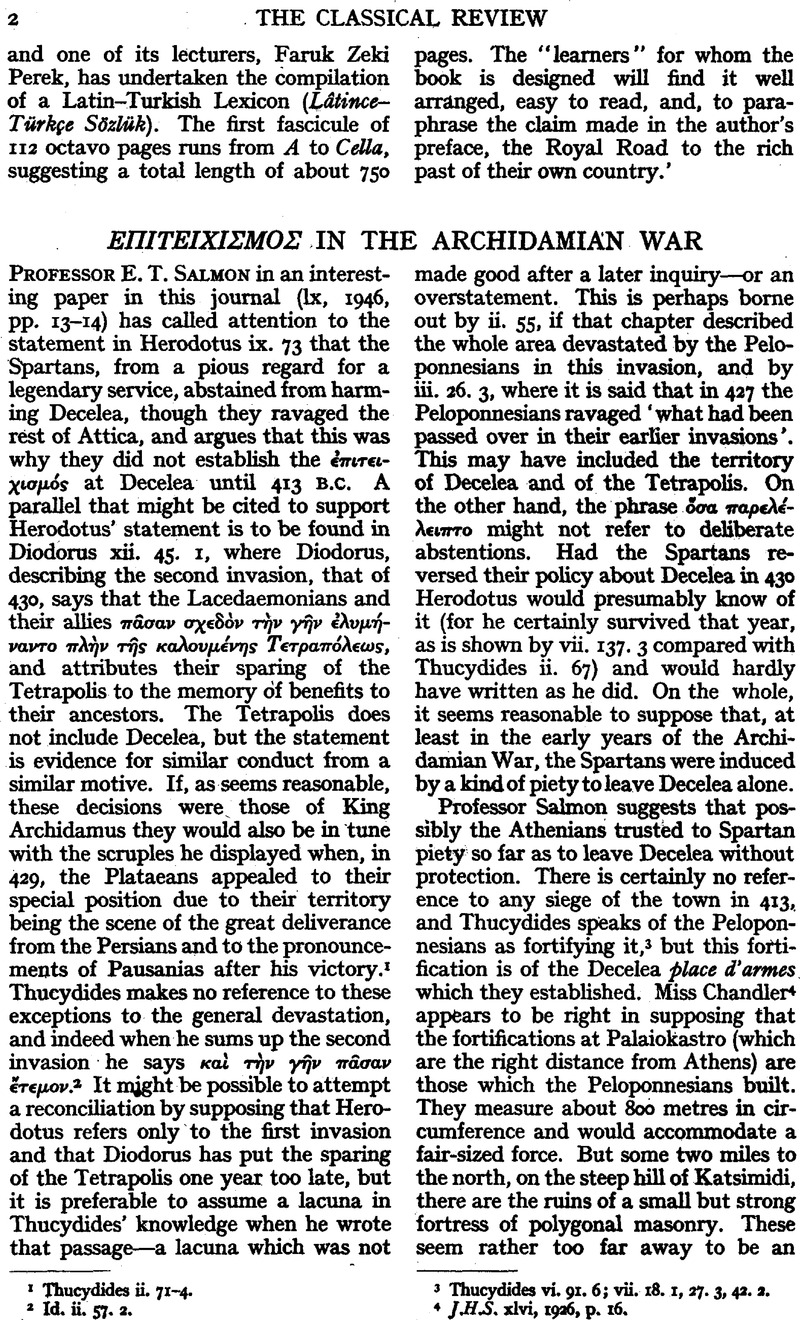No CrossRef data available.
Article contents
ΕΠΙΤΕΙΞΙΣΜΟΣ in the Archidamian War
Published online by Cambridge University Press: 27 October 2009
Abstract

- Type
- Review Article
- Information
- Copyright
- Copyright © The Classical Association 1947
References
page 2 note 1 Thucydides ii. 71—4.
page 2 note 2 Id. ii. 57. 2.
page 2 note 3 Thucydides vi. 91.6; vii. 18.1, 37.3,43.a.
page 2 note 4 J.H.S. 66, 1926, p. 16.Google Scholar
page 3 note 1 Thucydides vii. 28.1.
page 3 note 2 Id. vi.91.6.
page 3 note 3 Id. vii. 18. 4.
page 3 note 4 Cf. id. iv. 69.1; v. 82.6; vi. 44.1.
page 3 note 5 Id. vii. 27. 3; ii. 78. 2 (of the circumvallation ofPlataea).
page 3 note 6 Xenophon, Hell. i. 1.35.
page 3 note 7 Lines of circumvallation might be made defensible. The Athenians themselves, during two whole years, made no attempt on the fortified lines drawn round Plataea.
page 4 note 1 In arriving at the general considerations advanced in this and the preceding paragraph I am much indebted to the suggestions of Mr. G. T. Griffith and Mr. Hammond. Mr. Hammond urged-the difficulties that would attend an єпιтєιx03C7;ισμός, Mr. Griffith underlined the need fora clear margin of military superiority.
page 4 note 2 Thucydides ii. 31. 2.
page 4 note 3 Thucydides ii. 57.1.
page 4 note 4 Id. vii. 27. 4 πρ⋯τερον μ⋯ν γ⋯ρ βραχεαι γιγν⋯μεναι αἱ ⋯σβολα⋯ τ⋯ν ἄλλον χρ⋯νον τ⋯ς γ⋯ς ⋯πολα⋯ειν οὐκ ⋯κώlamda;υον. In 427 the Peloponnesians were concerned to destroy ⋯βεβλαστ⋯κει (id. iii. 26.3).
page 4 note 5 Id. ii. 58. 3.
page 4 note 6 Comb. Anc. Hist. v, p. an, refers to this year and not to the early months of the war.
page 4 note 7 Thucydides ii. 59.2.
page 4 note 8 Id. ii. 72.
page 4 note 9 Id. iii. I.
page 5 note 1 Thucydides iii. 15. 2, 16.
page 5 note 2 Id. iii. 26.4.
page 5 note 3 Id. iii. 89. 1.
page 5 note 4 Id. iii. 87.
page 5 note 5 647—53.
page 5 note 6 Thucydides v. 17. 2. As the reason given was ὃπως οἱ Ἀθηναῖοι μ⋯λλον ⋯igma;ακοιην, it is hard to see what else than an ⋯πιτειχισμ⋯ς in Attica was announced.
page 5 note 7 The word єпιтєιx03C7;ισις is one of those verbal nouns of which Thucydides is fond. If he made a distinction between this and єпιтєιx03C7;ισμός,єпιтєιx03C7;ισις may indicate a process,єпιтєιx03C7;ισις a result. Butthis distinction is not clearly borne out by his use of the two words wherethey occur.
page 5 note 8 Thucydides i. 122.1.
page 5 note 9 Id. i. 142. 3—4.
page 6 note 1 Thucydides iv. 41.3.
page 6 note 2 Professor Gomme in his Commentary on Thucydides, I, p. 418, has pointed out that the Persian use of Thebes may be regarded as ‘an instance of єпιтєιx03C7;ισμός in another form’. A parallel to this would be the Athenian use of Catana as a half-way house to Syracuse in the Sicilian expedition.
page 6 note 3 Thucydides ii. 56.
page 6 note 4 Thucydides iv. 3 ff.
page 6 note 5 Id. iv. 90 ff.
page 6 note 6 Id. iv. 42 ff.
page 6 note 7 Id. iv. 45. 2.
page 6 note 8 Id. iv. 5. 3 ff.
page 6 note 9 Id. iii. 51.1.
page 6 note 10 Id. iv. 69. r.
page 6 note 11 Id. iv. 118.4.
page 6 note 12 Id. iii. 92.4,93.
page 7 note 1 Thucydides iii. 31.1.
page 7 note 2 Id. iii. 33.3.
page 7 note 3 Id. iii. 85.
page 7 note 4 Id. iii. 34. Cf. the Samian exiles at Anaea
page 7 note 5 Thucydides vii. 27. 4.
page 7 note 6 Id. vii. 18.


